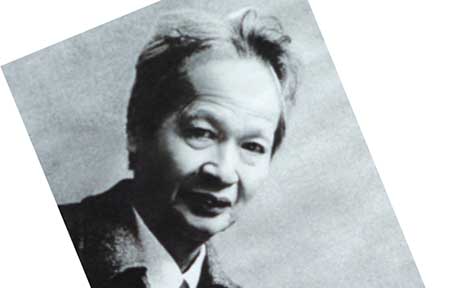Professor Tran Duc Thao - Typical historical and cultural celebrity of Bac Ninh in modern times
Professor Tran Duc Thao - one of the brilliant generation of Western intellectuals in the early 20th century. With the responsibility of a patriotic citizen, he is ready to give up the glorious path to return to the Fatherland and join hands with the people of the whole country to fight for national liberation and build the homeland and the country.

Professor Tran Duc Thao (September 26, 1917 - April 24, 1993)- Photo: Documentation
Philosopher Tran Duc Thao was born on September 26, 1917 in Song Thap village, now in Chau Khe ward, Tu Son city, Bac Ninh province. His father is Mr. Tran Duc Tien, an official of the Hanoi Post Office.
From childhood to studying abroad, Tran Duc Thao lived with his parents in Hanoi. In 1923-1935, he studied at French primary and secondary schools in Hanoi. He won the second prize in the Philosophy competition for French high schools and passed the baccalaureate in 1935.
In 1936, he received a scholarship to Paris to study and take the entrance exam to Ulm University of Pedagogy. From 1936-1943, he studied philosophy and received a special degree in philosophy education. In 1943, he was the valedictorian of Master of Philosophy at Ulm University of Pedagogy.
In December 1944, from a patriotic scholar, Tran Duc Thao began to fight for national liberation.
In September 1945, Tran Duc Thao wrote leaflets and held a press conference in support of the Viet Minh and the Government of President Ho Chi Minh. In December 1945, he was imprisoned by the French government. In the prison cell, Hao wrote the famous article "Sur l'Indochine" (On Indochina), protesting the French colonialists' return to invade Indochina as well as affirming the determination of the peoples of Indochina to gain independence
In February 1946, he was released due to the struggle of the French Communist Party, French intellectuals and overseas Vietnamese. Also in 1946, he was welcomed and met President Ho Chi Minh in France many times. He expressed his hope to return home to join the resistance war but was advised by Uncle Ho to stay in France to continue studying, doing scientific research and working in the patriotic overseas Vietnamese movement, enlisting the support of of French intellectuals, especially the intellectuals in the French Communist Party. Therefore, in the following years, Tran Duc Thao actively engaged in scientific and revolutionary activities in France.
On January 4, 1949, Tran Duc Thao was appointed by President Ho Chi Minh to be a member of the National Education Council (at this time he was in France).
In 1952, Tran Duc Thao returned home, then he went to the Viet Bac war zone to participate in the resistance war. In the Viet Bac war zone, he did practical research and reported to the Party Central Committee on the production activities of enterprises in Viet Bac and the status of schools in Vietnam.
In 1953, he worked at the Office of Comrade Truong Chinh as secretary of the General Secretary and translated his works. He was then appointed as a member of the Literature - History - Dialogue Committee (the predecessor of the Propaganda Department of the Party Central Committee and the Vietnam Academy of Social Sciences later).
Peace was restored in the North in 1954, Tran Duc Thao became Professor of Philosophy, Deputy Director of the University of Education and Literature, Dean of History Science, Hanoi University.
From 1961-1973, he worked as a senior officer of Truth Publishing House (now National Political Publishing House). From 1973-1993, he wrote newspapers and books in French and German.
In 1992, the Secretariat of the Central Committee of the Communist Party of Vietnam sent Professor to France to work in combination with medical treatment. Here, he completed the philosophical work "The problem of man and theoreticalism without man".
In early 1993, Professor Tran Duc Thao fell seriously ill and died on April 24, 1993 in Paris. The Professor's remains were brought back to Hanoi and buried at Van Dien cemetery.
Thanks to great ideological contributions in many fields such as: Anthropology, History, Literature, Psychology, especially Philosophy, in 2000 Professor Tran Duc Thao was posthumously awarded the prize by the State. Ho Chi Minh on social sciences.






